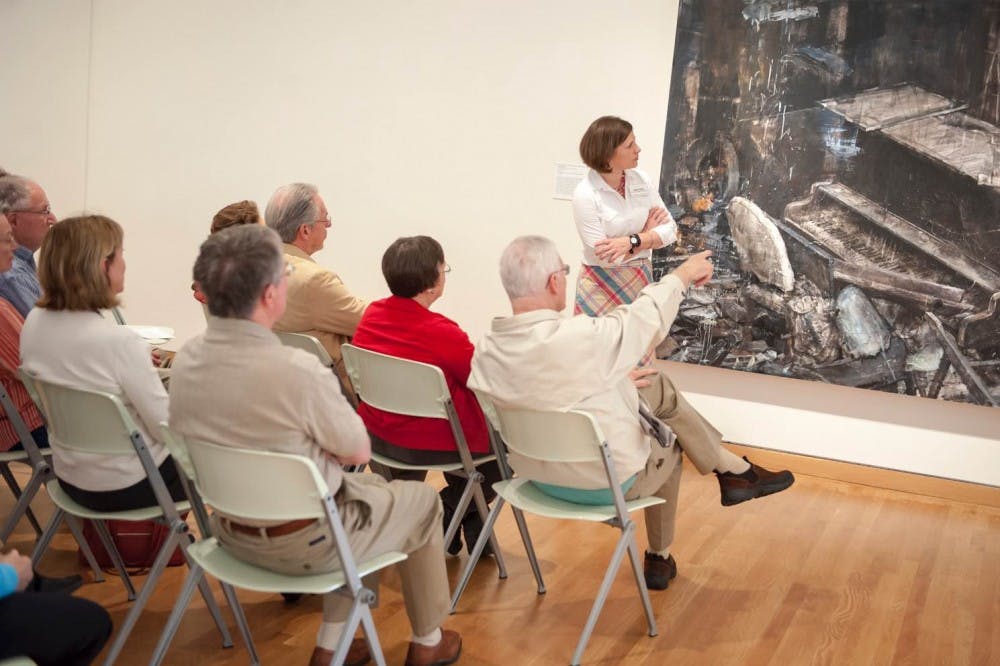For people with Alzheimer’s, life is a constant struggle, both against the disease and against the stigma it creates. Cognitive loss makes it harder for individuals to connect to friends and family, as well as to their own emotions and memories. Luckily, there are resources available to help patients cope with their experiences.
Formed in 2014, Reflections: The Nasher Museum’s Alzheimer’s Project is a joint effort by the Nasher Museum of Art and the Duke Family Support Program that provides tours for both caretakers and individuals impacted by Alzheimer’s. Inspired by Meet Me at MOMA, the Museum of Modern Art’s Alzheimer’s project that started in 2007, Reflections provides an opportunity for people with Alzheimer’s to have fun in a welcoming, social environment.
“For some people, it’s the first time they’ve been to a museum, but with our program it’s not intimidating,” explained Lisa Gwyther, director of the Duke Family Support Program.
Featuring a tour of the Nasher galleries, lunch and either an arts and crafts workshop or a musical performance, Reflections tours create a safe space where individuals with Alzheimer’s can discuss feelings and ideas about artwork without feeling judged due to their illness. The tour guides highlight critical thinking and emphasize to the patients that there are no wrong answers.
“The tours themselves are a pleasure; patients are receptive and their caretakers are appreciative,” said Jessica Ruhle, manager of public education at the Nasher.
Because a large portion of each tour includes returning members, patients create a friendly community with the others involved with Reflections. Caretakers also get to know each other and enjoy experiencing their loved one being happy and engaged at the museum. Since Alzheimer’s and other cognitive diseases are so stigmatized, it’s often hard for patients to find a welcoming place where they—and their loved ones—won’t have to worry about public embarrassment. Reflections tours offer them a new place to engage socially like they did before.
While Alzheimer’s disrupts a person’s daily life and personality, Reflections works to restore them for a while through discussion and involvement. In talking about artworks, patients are encouraged to look within their own emotions and memories to respond to a work. They are reminded of the contemplation that was possible before their disease and feel comfortable enough to express it with the group. They also listen to live music on some tours, and on the others participate in a craft like painting or ceramics in which they can flex their creativity.
“It’s great to see them light up and feel at home among friends,” Gwyther said.
In each of the tours, it’s clear that the people involved care about what they’re doing: they’re enthusiastic about the program and value the relationships they’re able to make with patients and caretakers. While most people coming in for tours at the Nasher are different from one week to the next, Reflections tours include patients that come again and again to be with their supportive community. This pattern facilitates not only relationships between participants, but also between participants and both the tour guides and the museum.
"It's inspiring to see the resilience in people who are dealing with loss, but who remain open to fresh perspectives through an arts experience,” Gwyther said.
In organizing the tours, the Nasher and Duke Family Support provide people with Alzheimer’s a rare opportunity to engage in a normalizing, welcoming environment. The tours run on a few Wednesdays every month and have expanded since their foundation to have more members.
“One of our goals is to expand the number of museums hosting these programs in North Carolina—there aren’t many museums doing them in the Southeast,” Ruhle said.
Considering the positive influence of the tours on its participants, hopefully these kinds of programs willbecome more commonplace as a part of the effort to destigmatize Alzheimer’s and provide a more welcoming environment for those affected.
Get The Chronicle straight to your inbox
Signup for our weekly newsletter. Cancel at any time.

